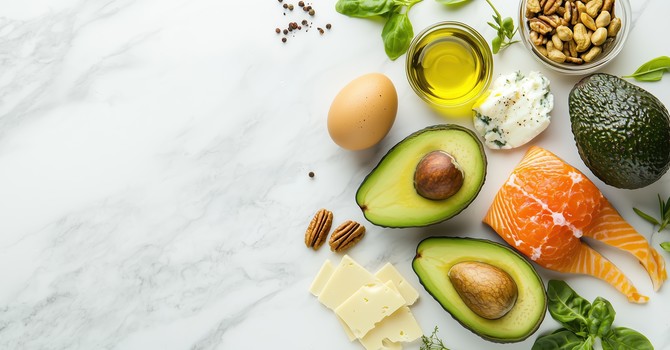
Polycystic Ovary Syndrome (PCOS) affects many women and can show up in different ways — irregular cycles, acne, fatigue, cravings, or changes in weight. While there’s no single “PCOS diet,” the right nutrition approach can support more stable energy, reduce symptoms, and help you feel better day-to-day.
As a Registered Dietitian working with women’s health and PCOS in Vancouver, here’s what I typically focus on with clients.
Build Meals That Support Steady Blood Sugar
Blood sugar swings can worsen many PCOS symptoms, so creating meals that digest slowly is key.
Aim for:
- Protein (eggs, tofu, fish, poultry, Greek yogurt)
- Fibre-rich carbs (oats, quinoa, potatoes, beans, whole grains)
- Healthy fats (avocado, nuts, seeds, olive oil, salmon)
- Colourful vegetables
Example meal: Roasted salmon + quinoa + roasted veggies + drizzle of olive oil.
This combo helps keep you full, supports energy, and curbs cravings later in the day.
Include High-Fibre Foods Regularly
Fibre helps with digestion, appetite, and more consistent blood sugar responses.
Great sources:
- Lentils, chickpeas, black beans
- Chia seeds, flaxseed
- Berries, pears, apples
- Whole grains and oats
Try adding 1–2 tbsp ground flax to yogurt or oatmeal — a simple upgrade with big benefits.
Choose Carbs in a Consistent, Not Restrictive Way
You don’t need to cut carbs with PCOS. What helps most is choosing carbs that give you long-lasting energy and pairing them with protein or fat.
Try:
- Whole grain bread instead of white
- Roasted potatoes with a source of protein
- Fruit paired with nuts or yogurt
- Rice mixed with edamame or chickpeas
Carbs are fuel — choosing them intentionally makes a difference.
Prioritize Omega-3 Fats
Omega-3s are known for supporting inflammation and overall health.
Include foods like:
- Salmon, sardines
- Hemp seeds
- Chia seeds
- Walnuts
Try this: Greek yogurt bowl with berries, walnuts, and chia — easy, satisfying, and nutrient-dense.
Add More Magnesium-Rich Foods
Many people with PCOS benefit from magnesium for sleep, energy, and muscle relaxation.
Food sources include:
- Pumpkin seeds
- Almonds
- Spinach
- Black beans
- Dark chocolate (70%+)
A magnesium-rich snack: apple slices + almond butter + sprinkle of pumpkin seeds.
Don’t Forget About Gentle, Sustainable Eating Patterns
Your eating routine matters as much as the food itself.
Helpful patterns include:
- Eating every 3–4 hours to avoid energy dips
- Having a consistent breakfast with protein
- Not skipping meals when life gets busy
- Reducing the “all-or-nothing” cycle around food
These habits often reduce fatigue, help mood, and make nutrition feel manageable — not stressful.
A Note on Supplements
Supplements can be useful for some people with PCOS, depending on symptoms, cycle patterns, bloodwork, and lifestyle. Common ones include:
- Inositol
- Vitamin D
- Magnesium
- Omega-3s
Always speak with a dietitian or your healthcare provider before starting new supplements to make sure they’re appropriate and dosed correctly.
PCOS Nutrition Is Personal — Not One-Size-Fits-All
Every person with PCOS has a different experience. The right nutrition plan depends on:
- Your symptoms
- Cycle patterns
- Activity level
- Stress, sleep, and lifestyle
- Any digestive concerns
- Other health conditions
Working with a Registered Dietitian can help you build a plan that’s realistic, supportive, and tailored specifically to you.
Managing PCOS can feel overwhelming, especially with so much conflicting information online. Focusing on steady energy, nourishing meals, and sustainable habits is a powerful place to start. You don’t need to overhaul everything at once — thoughtful, gradual shifts can meaningfully support your symptoms and help you feel more grounded and confident.
If you're looking for guidance on with your PCOS symptoms- we'd love to hear from you. Schedule your initial consultation with a Registered Dietitian in BC for individualized PCOS support. Check out our Women's Health page for more information on PCOS.



